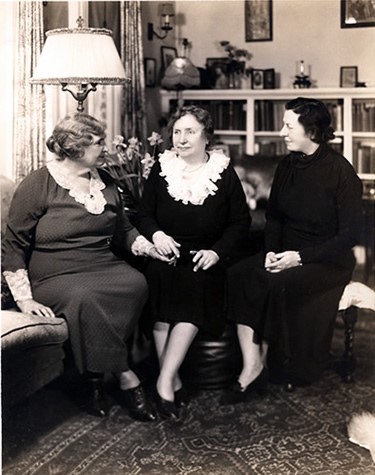Photograph circa 1924 of (left to right) Anne Sullivan Macy, Helen Keller, and Polly Thomson seated in the living room of their home in Forest Hills, Queens, New York. Helen and Polly wear knee-length dresses. Helen's dress has a white ruffled collar, as does Anne's. Her dress is calf length. Helen's right hand is placed within Anne's left as if in the middle of manually signing to her teacher.
Although the campaign was not a fund-raising success it was a public relations success. By 1927 Anne and Helen had addressed 250,000 people at 249 meetings in 123 cities. They had brought the issue of blindness to the awareness of more Americans across the country than had been achieved at any previous time. The women were invaluable—they knew it and so did Migel. The President and Executive Director used his formidable powers of persuasion to keep Anne, Helen, and Polly satisfied. He was canny enough to deal carefully with his famous employees, whom he flatteringly dubbed "The Three Musketeers."
As the years progressed, the trio and the aristocratic Migel became genuinely fond of one another. Migel wrote the following to Helen during their vacation trip to Scotland in 1933:
...In everything that we do and everything we wish done through you "Three Musketeers" our dominant thought is and always will be what would bring you the greatest happiness in the doing.
This is said in all sincerity and will always guide us all, and myself particularly—so just tell me exactly what you would prefer doing, and I will fully understand.
....I might tell you—confidentially—that I miss you three a great deal and although my visits to you have been sparse, my thoughts have been with you very, very frequently.
Drop me just a line occasionally, if you cannot write a letter—your communications are always treasured.
Full Transcript of Letter
M. C. Migel's Letter to Helen Keller (September 21, 1933)
Sept. 21st, 1933
Dear Helen:
I duly received your cable, "Shall I be needed this winter? Can't make plans until I know,"—and have replied as per copy enclosed, herewith.
We have a meeting of our Executive Committee on the 28th, and will discuss the matter more fully then with them—and communicate with you as to their reaction.
We feel that a continuation of the Endowment Campaign, if you care to undertake this, might be our primary object—but we also feel strongly that the Talking Book, which has gone forward very rapidly and in which we have great faith, would require special attention from someone well qualified to place this development -- its importance and advantages to the blind, -- before Committee in various States.
It is difficult to explain to you in writing exactly what we have in mind on this, but I am certain that when we see you, you will agree that this is a very important matter and apparently will be a tremendous boon to the blind of the entire country.
As to the Endowment Campaign—even if the financial results are not large, the tremendous influence for good that your presence alone brings about in the minds of the people toward our blind friends, is in itself a most gratifying accomplishment.
I gather from your cable that you would prefer remaining abroad longer. If so, my dear Helen, do not hesitate a moment to remain as long as you and Teacher and Polly see fit. In everything that we do and everything we wish done through you "Three Musketeers" our dominant thought is and always will be what would bring you the greatest happiness in the doing.
This is said in all sincerity and will always guide us all, and myself particularly—so just tell me exactly what you would prefer doing, and I will fully understand.
The summer has passed so rapidly and autumn is already with us; before we know it, we will have arrived at another new year. I think as the years creep upon us and we become older (not "old") we find time most evanescent and fleeting—the days, weeks and months move so rapidly that we are sometimes aghast to find that another season or year has rolled by.
Do you have the same experience—or am I alone in this?
I might tell you—confidentially—that I miss you three a great deal and although my visits to you have been sparse, my thoughts have been with you very, very frequently.
Drop me just a line occasionally, if you cannot write a letter—your communications are always treasured.
With affectionate greetings to the "Three Musketeers," believe me as ever.
Sincerely yours,
